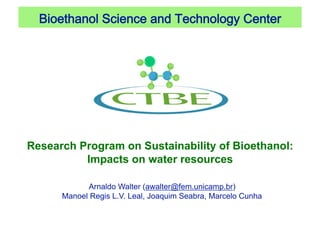
Research Program on Sustainability of Bioethanol: Impacts on water resources
- 1. Bioethanol Science and Technology Center Research Program on Sustainability of Bioethanol: Impacts on water resources Arnaldo Walter (awalter@fem.unicamp.br) Manoel Regis L.V. Leal, Joaquim Seabra, Marcelo Cunha
- 2. A clarification • The stage of the water resources proposal is still in the preliminary stage. • Some preliminary studies will be developed and based on the results a broader research program will be defined.
- 3. The main goals • Water resources should be preserved. Ethanol production must increase without any pressure on the availability and the quality of water resources. • The current situation is not yet well known, neither the impacts of changes that must occur in the production chain both in short- and in mid-term.
- 4. Short-term priorities • The changes already taking place in the sugarcane production process (e.g., green cane harvesting, trash blanket on the ground, and, in São Paulo, the regulations about vinasse application in the fields) could have impacts on the water resources in the cane producing areas. • The sugarcane cultivation expansion, with land use change, can have impacts on the water resources.
- 5. Mid-term priorities • The more radical changes in the production process, both in the field and in the factory, could have significant impacts (positive and negative) on the water resources. • Such impacts must be identified before hand in order to be possible to take mitigation actions and/or the appropriate modifications in the technologies, if necessary.
- 6. Questions that will guide specific studies • Is there precise knowledge on the availability of water resources for the sugarcane expansion to be viable? Does this knowledge exist for all regions where the expansion may take place? • Is there precise knowledge on the impacts of the sugarcane cultivation on the quality and availability of the water resources? Who (people; groups) has this knowledge? • Will the land use change (e.g., change from other crops to sugarcane) have an impact on the water resources? For which land use changes does this knowledge exists?
- 7. Questions that will guide specific studies • What are the impacts, in different regions (e.g., as a function of climate, soil type, etc.), of the changes in agricultural practices on water demand? Can precise results be obtained with computer models? If not, how many experiments must be carried out to get representative results? How long will it take to complete these experiments? • Will the changes in agricultural practices require changes in irrigation practices? How can this be simulated or tested? Can precise results be obtained with computer models? If not, how many field experiments would be necessary to obtain representative results?
- 8. Water resources: results within one year • Diagnosis of the state-of-art and of the potential impacts on water resources. • Proposal of the research project.
- 9. Partnerships • Still to de identified!
- 10. Thanks for attending! Thanks for your attention!! Questions?
